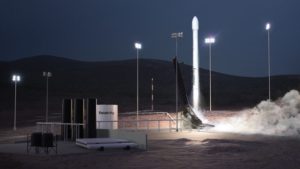WASHINGTON launch vehicle programmer Relativity Space has gained a contract to establish Iridium replacement satellites, which it intends to take out from a launch site it proposes to grow at Vandenberg Air Force Base.
Relativity announced June 24 it won a contract out of Iridium for”on-demand” launches of six replacement satellites using its Terran 1 rocket. Those launches would take place beginning no earlier than 2023.
One Iridium Next satellite, launched as needed to fill any gaps in the constellation of Iridium would be carried by each mission. The two tanks, built together with the 75 launched on eight Falcon 9 flights involving January 2019 and also January 2017, are now in ground storage.
“Relativity’s Terran 1 matches our launch needs to LEO nicely from both a price, responsiveness and capability perspective.”
“They picked us because we now have the payload volume, mass, pricing and responsiveness needed to do the six dedicated launches,” explained Tim Ellis, chief executive of Relativity, at an interview, stating winning a contract by a”blue chip” operator such as Iridium was a significant endorsement of his company.
Relativity expects to carry out the launches by a site the company plans to grow at Vandenberg. Relativity separately announced it had obtained a”right of entry” in the Air Force for a site called B-330 at Vandenberg it would use for missions to sun synchronous orbits.
The site, which now hosts processing centre and a storage, is south of launch pads at Vandenberg. “That is actually valuable, because we will not overfly some current major launch centers,” Ellis explained. “That opens up the ability to possess larger launch windows and not worry about overflying national resources .”
The right of entrance is the beginning of the procedure for creating a launch website. Ellis explained the upcoming steps are an environmental study and evaluation of the site together with all the 30th Space Wing, which works the Vandenberg launch sites.
Construction of the Vandenberg launch site could begin after both obtaining final approvals in the Air Force to your site in addition to conclusion of Relativity’s very first launch site at Cape Canaveral Air Force Station’s Launch Complex (LC) 16. The business obtained an identical right of entrance for LC-16 at January 2019, and Ellis explained a formal site license there is”imminent,” which will allow the company to begin construction of launch facilities.
The initiation of the Terran 1 is scheduled for later in LC-16 in 2021. The business has resumed tests of its Aeon engine in Mississippi who was on hold while the center was closed during the pandemic. Ellis said tests of the initial”fully integrated” flight engine begins there this fall, followed by next stage testing at the beginning of 2021 and initial stage examining a”short time” after.
That program is later compared to the business’s original plans, which Ellis stated was due in part to fluctuations in the design of the rocket fall to accommodate a much payload fairing. “That was very worth it, we believed, because that uniquely allowed us to establish these larger spacecraft,” such as the Iridium Next satellites in addition to those suggested for Telesat’s LEO broadband constellation. Relativity announced a contract for this constellation with Telesat year for an unspecified number of releases of satellites.
Ellis considers that, together with the payload capability of the Terran 1 and the new Vandenberg launch site, it will have the ability to win company that was going to vehicles such as Arianespace’s Vega and India’s Polar Satellite Launch Vehicle. “We’re seeing a great deal more clients that want polar and sun-synchronous starts,” he explained. “We’d really like to attract that company back to the usa.”
– Advertisement –
